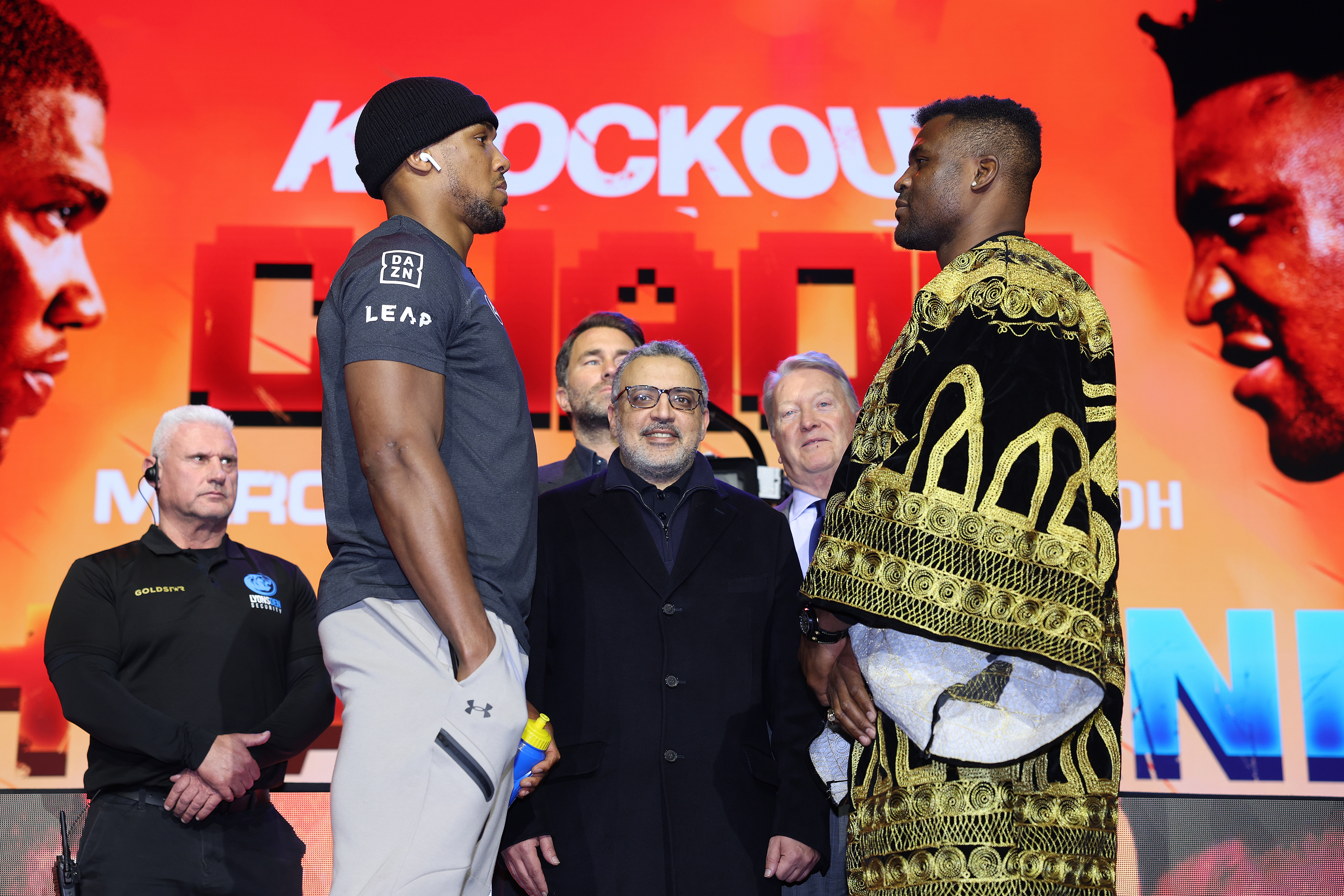Francis Ngannou appears to have mocked Anthony Joshua's recent darkness retreat in his chilling prediction for their upcoming fight in Saudi Arabia.
Darkness retreat raises eyebrows
AJ surprised boxing fans when he revealed that he spent time on a retreat in complete darkness, in order to be alone with his thoughts.
Joshua forked out £2,000 for a four-day stay at the Sky Cave Dark Retreat in Southern Oregon, just weeks before his dominant victory over Otto Wallin.
Ngannou's warning
Ngannou has seemingly referenced Joshua's retreat in a chilling warning ahead of their fight in Riyadh.

The Predator said, "If I catch him, then he’s going to sleep. Remember, this is the heavyweight division and everyone is quite strong. You should keep your chin away."
He added, "Don’t go there and sleep [on your opponent] and say: ‘Oh, he’s not the hardest puncher.’ If you put your chin in the right position and get hit, even by the lightest fighters, then you might wake up in the white room."
Joshua not underestimating Ngannou
Joshua is well aware of Ngannou's power, especially after witnessing him drop Tyson Fury last October.
He is refusing to underestimate the challenge he faces in what some consider to be a "lose-lose fight".

Joshua said, "If Tyson underestimated Ngannou, I sure won't. Francis has lost the element of surprise with me."
He added, "We knew Francis had a reputation as the biggest puncher in the world but the surprise was how well he boxed. He made life very complicated for Tyson. So much so that I do belong to the opinion that he beat Fury."
Frequently Asked Questions
How important is recovery to boxing training?
Recovery is essential in boxing because it allows the body to grow and heal. Recovery is aided by proper rest, stretching exercises, sufficient sleep, hydration as well as a nutritious and balanced diet. Ignoring recovery can lead to overtraining, injuries, and decreased performance.
Can boxing enhance mental health?
Boxing has the ability to significantly improve mental well-being by reducing stress and improving mood. It also boosts self-esteem while promoting discipline. The mental focus needed during training can act as a kind of meditation. This helps to improve your concentration and clarity.
How long is it necessary to learn boxing?
The time taken to become proficient in Boxing can vary widely between individuals. It depends on factors like natural ability and consistency in training. With regular training, your basic skills could improve significantly within a few short months.
How can I protect myself when boxing?
To defend yourself in boxing you can use a few techniques. For example, maintaining a solid defense with your hand up, using footwork as if to maintain distance and utilizing head movements like slips, roll and weaves. As important as learning your offensive moves, it is also crucial to learn defensive skills.
How do you choose the right size boxing glove for your hand?
Size and type depend on weight, level of protection needed, and the activity that you are engaging in. Gloves come in ounces. Beginners often begin with gloves that are 12oz and 14oz for general training, then move up to heavier gloves when sparring.
How many times should a novice boxer train per week?
Beginners should aim to do two or three sessions of boxing per week. This will allow for adequate rest and recovery time. As you get more comfortable with the sport and gain fitness, you can increase the intensity and frequency of your training.
What is the proper boxing stance?
The classic boxing stance involves standing with your feet shoulder-width apart, the lead foot forward, and the rear foot at a 45-degree angle. You should have your knees slightly bent and your weight evenly distributed on your balls of feet. Keep your hands raised to shield your face. Tuck your elbows in to protect your torso.
Statistics
- Around 90% of boxers suffer a minor injury over the course of a year, with only 10-15% experiencing a moderate to severe injury.
- About 25% of people who take up boxing transition to competitive amateur boxing within their first two years of training.
- Studies suggest that about 30% of beginner boxers tend to neglect the importance of footwork in their initial training phase.
- Despite the stereotype that boxing is a young person’s sport, approximately 20% of all beginners are over the age of 40.
- Nearly 95% of boxing trainers agree that mental conditioning is just as important as physical training for beginners in the sport.
- Beginner boxers tend to make the mistake of holding their breath in 70% of cases during their initial training sessions.
- Studies show that proper hand wrapping can reduce the chance of hand and wrist injuries by as much as 40%.
- Roughly 75% of beginners do not employ adequate defensive tactics in their first sparring sessions.
- On average, beginners who undergo proper boxing training can expect to burn anywhere from 300 to 500 calories per hour.
- An analysis of boxing workouts demonstrates that participants can maintain a heart rate at 75-85% of their maximum, which is the optimal range for cardiovascular training.
External Links
joinfightcamp.com
ringside.com
wikihow.com
menshealth.com
boxingforlife.com
myboxingcoach.com
sneakpunch.com
expertboxing.com
globalfightcenter.com
proboxing-fans.com
How To
How to Stand Correctly In a Boxing Stance
Proper stance is essential to boxing. Stand with your feet shoulder-width apart, your non-dominant foot forward. Angle your back foot at 45 degrees, and distribute your weight evenly. Your knees should be bent slightly. Tuck your elbows in close to your body and keep your gloves raised to protect your face. For agility, stay on your balls. Your body should be relaxed yet ready to move swiftly and throw punches effectively.

